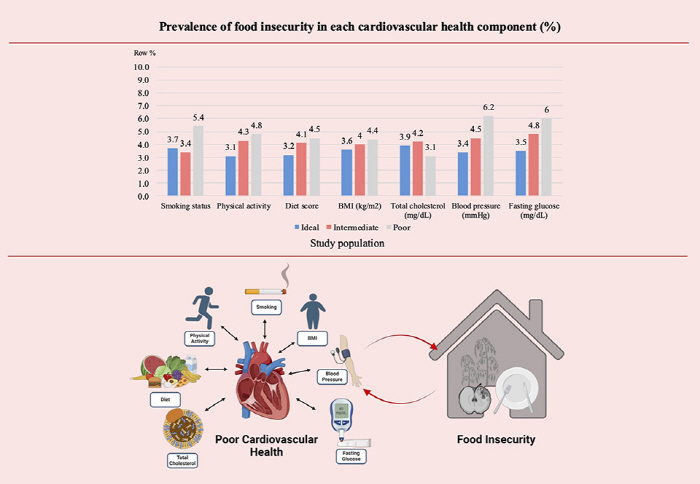1.32 times higher risk of food insecurity intake, cardiovascular health decline...the greatest effects of smoking and high blood pressure
|
In particular, smoking and high blood pressure were found to be key cardiovascular health components affected by food insecurity, and they were also deeply related to factors such as household income and education level, indicating that it is urgent to come up with measures to resolve health inequality among the vulnerable.
Professor Kang Seo-young of the Department of Family Medicine at Uijeongbu Eulji Hospital (corresponding author) and a research team at Eulji University School of Medicine (first author, 2 years old) released the results of a detailed analysis of health indicators of 14,034 Korean adults over the age of 19 using data from the 2019-2021 National Health and Nutrition Survey.
The research team evaluated the health of the analysis based on seven cardiovascular health indicators (smoking, physical activity, diet, body mass index, total cholesterol, blood pressure, and fasting blood sugar) presented by the American Heart Association, and compared them into 'anxiety group' and 'stable group' depending on food instability.
As a result, the unstable group, which accounted for 4% of the total, had a 1.32 times higher risk of cardiovascular health decline than the stable group.
In addition, the more severe the degree of instability, the greater the risk of cardiovascular health decline.
In particular, the unstable group showed worse results in smoking rate and hypertension indicators.
Student Clubby explained "Food instability goes beyond mere nutritional deficiencies and shows that it is a social factor that can cause cardiovascular health inequality and deepen the health gap."
The team noted that economic, social, and physical factors of individuals or households can cause food insecurity.
For this reason, food insecurity may be difficult to reliably secure enough, safe, and nutritious food needed to maintain a healthy and vibrant life.
In addition, food insecurity goes beyond simply skipping meals and is a form of life-based instability such as lack of food quality and diversity, and anxiety about purchasing food.
Previous studies have also reported that food insecurity is at a higher rate in vulnerable groups such as low-income families, elderly people living alone, and single-parent families, and is affected by various external factors such as intensifying income inequality and rapid inflation.
This is why the World Health Organization (WHO), academia, and the medical community are wary of the health gap caused by food insecurity.
Professor Kang Seo-young emphasized that "this study is meaningful in that it analyzed the association between food insecurity and cardiovascular health using large-scale population data in Korean adults, providing an important basis for future health policy establishment."
Subsequently, "Easing food insecurity in policy can also contribute to the prevention of cardiovascular disease."," he added.
Meanwhile, the study was published in the latest issue of the Korean Circulation Journal (IF=3.1), a journal of the Korean Society of Cardiology listed in the SCIE under the title 'Relationship Between Food Insurance and Por Cardiovascular Health in Korean Adults'.
|
This article was translated by Naver AI translator.





